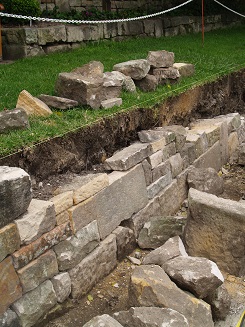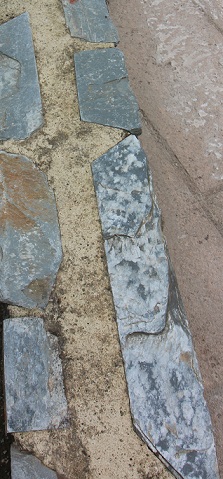Understand building from the foundations up

Masonry commonly refers to construction with brick, stone or concrete units joined together with mortar to create structures. Those structures may be buildings, fences, walls, or perhaps something else.
Definitions of masonry vary though. One definition may be the work undertaken by a “mason”. Some definitions describe masonry as working with clay or concrete bricks and stone. Other definitions may consider masonry as working with a more diverse range of materials including glass bricks, cobbles and ceramic blocks and tiles.
This course is mostly about understanding materials used by bricklayers, stone workers, concreters and masons; and expanding your knowledge of the different ways those materials may be used to both build and repair things. You are encouraged to conduct your own research along the way and to watch videos on the internet to add to your understanding. You will also need a basic set of masonry tools and access to some brick, stone, concrete and cement, as well as basic masonry tools.
Learn to work with brick, stone and concrete
This course will help you with construction and repair of walls, fences, buildings or other structures.
- Build your own shed, landscape or home.
- Conduct repairs and avoid spending so much hiring tradesmen.
- Develop knowledge and skills to work in construction, contracting or property management.
- Start a business as a handyman, landscaper or something else and grow your business as you learn.
COURSE CONTENT
Brick And Stone Work is a 100 hour self paced course comprising 9 lessons as follows.
1. Scope and Nature of Masonry
- terminology
- masonry tools
- ready mix or hand mixed concrete
- masonry materials
- types of stone
- legal requirements
- foundations
- joining
2. Cement and Concrete
- cement
- cement terminology
- the American society for testing and materials (astm)
- concrete
- what is the difference between drying and curing?
- psi strength of concrete
- concrete masonry units
- concrete foundations
3. Construction Method and Structural Considerations
- setting out levels
- understanding loads
- types of walls
- making construction stronger
- dealing with movement
- movement joints
- using moisture controls
- using metal
- copings and caps
4. Working with Brick
- types of bricks
- laying bricks
- bonding
- choice of bond
- locking your construction in place
- how to cut bricks
- damp-proofing
- building a brick garden wall
- how to construct brick arches
- piers
- cavity wall construction
- wall openings
5. Working with Stone
- types of stone used in construction
- stone walls
- stone walls for landscaping
- free standing stone walls
6. Construction for Fire: Fireplaces, bbq’s, kilns, ovens and fire pits
- how to construct fireplaces and chimneys
- chimneys that do not work
- indoor slow combustion burners and wood/coal burning stoves
- brick barbecues
7. Landscape Applications & Hybrid construction
- paving
- outdoor steps
- other garden features
- furniture
- pedestals and plinths
- wishing well
- letter box
- follies
- water features
8. Repair and Miscellaneous Work
- paints and sealants
- plastering walls
- fixing plaques to masonry
- damaged walls
- surface damage and structural damage
- problems with paving & driveways
9. Building Applications: houses, farm and commercial buildings
- choosing a site
- setting out buildings
- legalities
- special project
COURSE AIMS
- Describe the materials, tools and equipment used for masonry construction, and the nature and scope of work that might be undertaken by those skilled in the use of those tools and materials.
- Explain how to use cement as a mortar or in concrete appropriate to the circumstances of construction
- Explain how to construct with brick stone or concrete in a way which is structurally sound and appropriate to the circumstances.
- Explain how to work with different types of bricks for different construction purposes
- Explain how to build different things with different types of stone.
- Explain how to build fireplaces and other structures that will be exposed to fire.
- Explain the use of masonry in the landscape
- Explain how stone, brick or concrete should be maintained and repaired when damaged
- Explain the construction of a house and other type of building with brick, stone and concrete.
WHAT IS MASONRY?
 Masonry commonly refers to construction with brick, stone or concrete units, joined together to create structures. Those structures may be buildings, fences, walls, or perhaps something else.
Masonry commonly refers to construction with brick, stone or concrete units, joined together to create structures. Those structures may be buildings, fences, walls, or perhaps something else.
Definitions of masonry vary though. One definition may be the work undertaken by a “mason”. Some definitions describe masonry as working with clay or concrete bricks and stone. Other definitions may consider masonry as working with a more diverse range of materials including glass bricks, cob and ceramic blocks and tiles.
This course is mostly about understanding materials used by bricklayers, stone workers, concreters and masons; and expanding your knowledge of the different ways those materials may be used to both build and repair things.
WHO COULD BENEFIT FROM THIS COURSE?
- Property owners
- Handymen
- Landscape Gardeners
- Building Contractors
- Project Managers/Property Developers
- Garden Designers
- Property Managers
- Hardware Store staff
Study with ACS
- Benefit from the knowledge and experience of our tutors.
- Quality courses to study at your own pace, with full tutor support for the duration of your studies.
- Online or eLearning options give you the flexibility to study where and when you want to.
Any Questions?
If you have any questions or need help in choosing the right course for you, please get in touch with one of our Masonry tutors - they will be more than happy to help you with any questions that you may have. Please get in touch using our FREE COURSE COUNSELLING SERVICE.